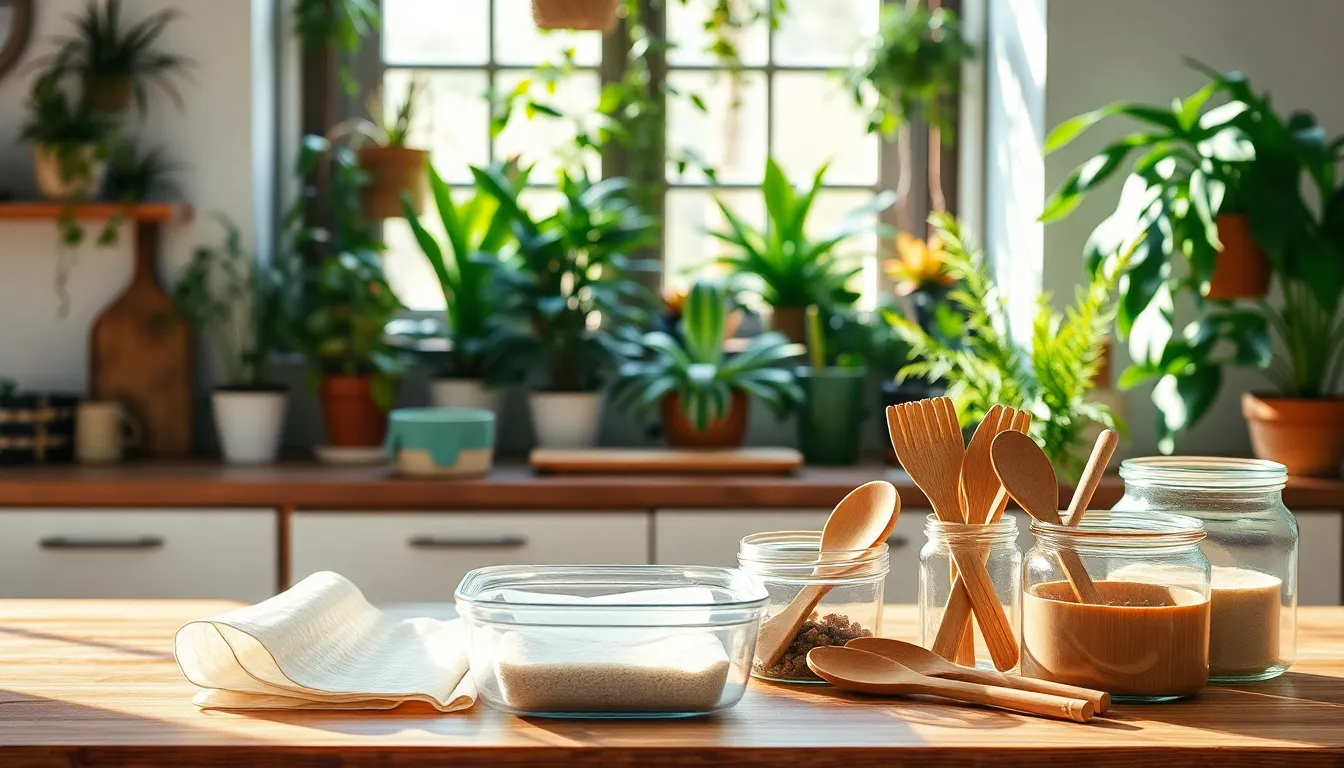In a world where every little choice counts, the kitchen is the perfect battleground for eco-warriors. Who knew that swapping out plastic wrap for beeswax wraps could save the planet and make leftovers look like a gourmet meal? With a sprinkle of creativity and a dash of humor, transforming a typical kitchen into an eco-friendly haven is not just possible, it’s downright fun.
Table of Contents
ToggleImportance Of Eco Kitchen Essentials
Eco kitchen essentials play a crucial role in promoting sustainability. Reducing reliance on single-use plastics significantly minimizes waste. Utilizing reusable materials, such as beeswax wraps, contributes to healthier food storage practices. Sustainable kitchen tools not only benefit the environment but also enhance cooking experiences.
Choosing eco-friendly utensils, like bamboo or stainless steel, supports responsible sourcing and minimizes depletion of natural resources. Adopting energy-efficient appliances lowers energy consumption and reduces utility bills. Efforts to incorporate composting systems create nutrient-rich soil, thus promoting a circular economy.
Switching to eco-friendly cleaning supplies helps minimize toxic chemical exposure. Most conventional cleaners contribute to water pollution, while natural alternatives offer safer options for homes and the environment. Undergoing this transformation fosters a cleaner, healthier kitchen space for both individuals and families.
Being mindful of food waste is essential. Planning meals and using appropriate storage solutions lead to less spoilage and encourage resourcefulness. Investing in sustainable kitchen essentials often reflects values of environmental stewardship and conscious living.
Incorporating these practices cultivates an eco-conscious mindset. The cumulative impact of such changes contributes significantly to global sustainability efforts. Emphasizing eco kitchen essentials not only benefits the planet but also influences wider community habits, creating a ripple effect of positive change.
Key Features Of Eco Kitchen Essentials

Eco kitchen essentials prioritize sustainability, enhancing both cooking and environmental health. Key features include sustainable materials and energy efficiency, which contribute significantly to reducing ecological footprints.
Sustainable Materials
Eco-friendly kitchen items often utilize bamboo, stainless steel, and glass. These materials possess durability, reducing the need for frequent replacements. Additionally, bamboo utensils and glass containers decompose better than plastic counterparts. Compostable sponges and reusable beeswax wraps also minimize waste significantly. Choosing products made from recycled materials further supports responsible sourcing. Many eco-conscious brands focus on ethical production practices, ensuring their items perform well while safeguarding the planet.
Energy Efficiency
Energy-efficient appliances save both energy and money. These devices consume significantly less electricity than traditional options, reducing utility bills over time. Incorporating energy-efficient lighting, such as LED bulbs, further enhances kitchen sustainability. Smart technology and programmable settings also allow individuals to optimize energy use effectively. Regular maintenance ensures ovens and refrigerators operate efficiently. By selecting Energy Star-rated products, individuals contribute to a smaller carbon footprint while enjoying improved performance in their kitchens.
Must-Have Eco Kitchen Essentials
Making eco-friendly choices in the kitchen is easier with the right essentials. These items promote sustainability and reduce environmental impact.
Reusable Storage Solutions
Glass containers and stainless steel jars offer durable alternatives to plastic. They store food effectively while reducing waste. Silicone bags replace single-use plastic bags, providing a reliable option for meal prep and snacks. Beeswax wraps act as a sustainable substitute for plastic wrap, keeping food fresh without harmful chemicals. Choosing these reusable solutions fosters a cleaner kitchen and aids in minimizing plastic dependence.
Eco-Friendly Utensils
Bamboo utensils are lightweight and strong, providing an eco-conscious option for cooking and serving. Stainless steel straws eliminate the need for disposable plastic, significantly cutting down waste. Similarly, compostable wooden cutlery offers a stylish and sustainable alternative for outdoor gatherings. Reusable silicone kitchen tools enhance cooking experiences without adding to landfills. Selecting eco-friendly utensils showcases commitment to sustainability in everyday cooking.
Biodegradable Cleaning Supplies
Natural cleaning products, made from plant-based ingredients, are safer for both people and the environment. Brands producing biodegradable sponges and cloths help reduce plastic waste. Vinegar and baking soda serve as effective cleaning agents, minimizing reliance on harsh chemicals. Compostable trash bags provide a guilt-free way to dispose of kitchen waste. Using biodegradable cleaning supplies promotes a healthier kitchen and supports eco-conscious habits.
Tips For Transitioning To An Eco-Friendly Kitchen
Begin by evaluating current kitchen items. Identify plastic storage containers that can be replaced with glass or stainless steel alternatives. Exploring local thrift stores can uncover one-of-a-kind kitchen tools made from sustainable materials.
Integrate reusable bags for groceries and storage. Opt for beeswax wraps instead of plastic wrap to keep food fresh, contributing to less waste. Choosing compostable sponges helps reduce the environmental impact of everyday cleaning tasks.
Focus on energy-efficient appliances. Prioritize Energy Star-rated products which use less electricity and cut down utility bills. Consider replacing incandescent bulbs with LED options for better energy conservation.
Experiment with composting. Set up a compost bin for organic waste like vegetable scraps, enhancing nutrient levels in gardening soil. Utilize natural cleaning supplies made from plant-based ingredients to create a healthier cooking environment.
Incorporate meal planning into the weekly routine. Planning meals reduces food waste and encourages the use of seasonal, local ingredients. Selecting food from farmers’ markets supports local agriculture while promoting sustainable farming practices.
Encourage friends and family to participate in the eco-friendly kitchen transition. Share tips and favorite recipes that utilize sustainable cooking methods. Joining community workshops on green living fosters deeper connections with like-minded individuals dedicated to sustainability.
Engage in mindful shopping. Choose products with minimal packaging to further reduce single-use plastics. Research brands that prioritize ethical production practices, ensuring purchases contribute positively to the environment.
Transforming a kitchen into an eco-friendly haven is both achievable and rewarding. By embracing sustainable practices and selecting eco kitchen essentials, individuals can significantly reduce their environmental impact while enhancing their cooking experience.
Every small change counts from opting for reusable storage solutions to incorporating energy-efficient appliances. These choices not only promote a healthier kitchen but also inspire others to adopt similar habits.
Cultivating an eco-conscious mindset fosters a sense of community and contributes to broader sustainability efforts. With creativity and commitment, anyone can make their kitchen a model of environmental responsibility.


